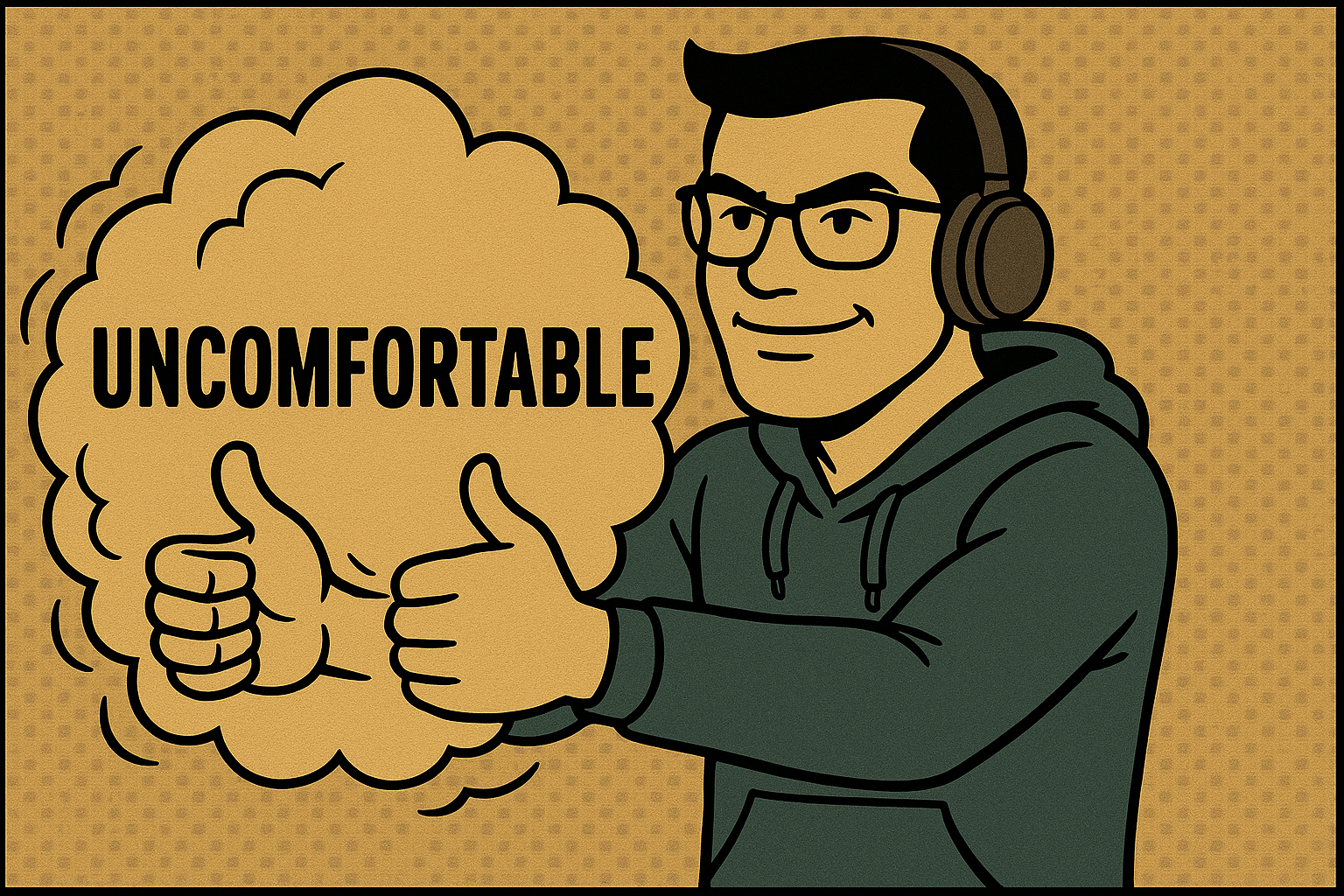Growth happens at the edges of your comfort zone. Not beside it. Not near it. Right at the ragged edge where your palms sweat and your mind races with doubt.

Most founders I talk to know this intuitively. Yet our natural human programming fights against it constantly, pulling us back toward the familiar, the safe, the known.
The problem is that startups and comfort are fundamentally incompatible. The entire concept of creating something from nothing requires living in uncertainty. If what you're building was obvious and comfortable, someone else would have already built it.
The Comfort Trap
I've seen this pattern repeatedly. A founder builds something disruptive. They push boundaries. They make uncomfortable decisions. They face rejection. They persist. Eventually, traction comes.
Then something shifts.
Success breeds routine. Routine breeds comfort. Comfort breeds complacency. And complacency is the silent killer of innovation.
The metrics look good. The team is growing. The board is happy. Why rock the boat?
Because the moment you stop rocking the boat is the moment you start drifting wherever the current takes you.
The Serial Founder's Fallacy
What's particularly insidious is how this plays out with serial entrepreneurs. I've watched countless second and third-time founders unconsciously recreate their previous company—same management style, same market approach, same tech stack, same hiring profile. They're solving yesterday's problems with yesterday's solutions. What worked before becomes a comfortable template, a well-worn path that feels deceptively safe. But they're not actually building a new company; they're attempting to replicate their last success in slightly different packaging. The market has moved. The technology has evolved. The competitive landscape has shifted. Yet they remain anchored to their past victories, blind to how their hard-earned comfort is actually preventing them from seeing the unique challenges and opportunities of their current venture. Their previous success becomes the very thing that limits their next one.
Discomfort as a Compass
I've come to see discomfort as a reliable signal. When I feel that knot in my stomach before a decision, it usually means I'm onto something important. The conversation I'm avoiding is probably the one I most need to have. The feature I'm scared to cut is likely the one dragging us down.
Discomfort doesn't guarantee you're right, but comfort almost always guarantees you're not pushing hard enough.
Consider:
- Every pivot requires abandoning something you've invested in
- Every price increase risks customer pushback
- Every major product change will be hated by someone
- Every difficult personnel decision comes with sleepless nights
These moments define companies. Not the comfortable quarters when everything goes according to plan.
Become Curious About Discomfort
Over the last couple of decades, neuroscience has revolutionized our understanding of anxiety and how to manage it. Research shows that what we experience as discomfort is often our brain's threat detection system working overtime. Working with founders to transform their discomfort into informed decisions has taught me one powerful approach: replace fear with curiosity.
When you notice that tightness in your stomach or the mental double-checking that signals discomfort, get curious instead of reactive. What specific aspects of this situation are triggering my response? What assumptions am I making? What's the worst that could actually happen here?
This shift from anxiety to inquiry doesn't just feel better—it produces better outcomes. Recent studies suggest that curiosity activates different neural pathways than anxiety, shifting us from reactive limbic system responses to more measured prefrontal cortex processing. Rather than having stress hormones cloud judgment, curiosity creates the mental space for clearer thinking and more creative problem-solving.
I've seen founders transform their relationship with discomfort by asking questions rather than avoiding feelings. The best decisions often come not from ignoring discomfort but from mining it for the valuable information it contains. Your anxiety is trying to tell you something—learn to listen to the message without being overwhelmed by the messenger.
Practicing Discomfort
Like any skill, embracing discomfort requires practice. Some approaches I've found valuable:
Make the uncomfortable decision slightly earlier than feels natural. By the time something feels obviously wrong, you've usually waited too long to address it.
Put yourself in situations where you can't rely solely on existing knowledge. Learn a new skill. Talk to customers from industries you don't understand. The mental flexibility this creates is invaluable.
Create mechanisms that force transparency. Regular customer interviews. Open team feedback. Financial metrics everyone understands. The truth is often uncomfortable, but it's always valuable.
The Paradox of Stability
The irony is that long-term stability comes from embracing short-term discomfort. The founders who avoid difficult conversations, decisions, and changes eventually face even greater challenges when reality catches up.
The most sustainable companies I know don't avoid discomfort—they institutionalize it. They build processes that surface problems early. They reward people who identify risks. They make space for awkward conversations.
This isn't about manufacturing chaos or glorifying struggle. It's about recognizing that growth and comfort rarely coexist.
Finding Your Edge
We each have different comfort zones. What terrifies one founder energizes another. The key isn't pushing against every boundary simultaneously, but honestly identifying which discomforts are holding you back.
Is it difficult customer conversations? Financial planning? Technical decisions? People management? Public speaking?
Wherever you feel that resistance, that's your growth edge. That's where your attention belongs.
The best founders I know aren't fearless. They're afraid all the time. They just do the scary things anyway, understanding that discomfort is simply the feeling of getting stronger.
So embrace the sweaty palms. Welcome the racing thoughts. They're not warning signals—they're growth indicators.
The most valuable things in life rarely happen inside our comfort zones. Why would building a company be any different?